This article was co-authored by Moshe Ratson, MFT, PCC. Moshe Ratson is the Executive Director of spiral2grow Marriage & Family Therapy, a coaching and therapy clinic in New York City. Moshe is an International Coach Federation accredited Professional Certified Coach (PCC). He received his MS in Marriage and Family Therapy from Iona College. Moshe is a clinical member of the American Association of Marriage and Family Therapy (AAMFT), and a member of the International Coach Federation (ICF).
There are 7 references cited in this article, which can be found at the bottom of the page.
This article has been viewed 48,587 times.
It can be tough for the more sensitive of us to weather the emotional storms of daily life, be they critical opinions of us, discomforting topics, or any other hardships. This sensitivity is innate nature, informed by life experiences, and it should not be thought of as weakness or as a simple choice the person is making. Indeed, if it was as simple as choosing not to be “so sensitive,” why wouldn’t we? Luckily, there are tactics a person can take to better handle overwhelming situations.
Steps
Understanding Your Reactions
-
1Reflect on your emotions. Are you reacting with anger, worry, offense, embarrassment, or disappointment? Why did this situation or comment provoke this in you? It’s difficult to neutralize powerful reactions in the moment, but the more mindful you are of your behavior the better equipped you will be to alter it as necessary moving forward.[1]
- Say, for example, you said your opinion only to get contradicted by an acquaintance.
- You feel flushed and overwhelmed. Is it because you're embarrassed to be wrong, or angry with your acquaintance's choice of words?
- Taking time to determine exactly why you felt overwhelmed is an important first step to beating that feeling in the future.
-
2Analyze your role in the issues. If you're repeatedly having your feelings hurt by a certain person or situation, there's a reason. Someone isn't always at fault, and someone isn't always in the wrong, but there's always a reason, as simple as that may sound. Determine the reason and what role you honestly play in it.
- If your role is that you've experienced emotional trauma in your past related to those issues, consider counseling if your coping methods have proved ineffective so far for you.[2]
Advertisement -
3Overcome this for yourself. Meaning: make sure you’re doing this because you feel it would be best for you, your well-being, and your coping skills, and not because someone else told you it was something you lacked or needed. There are many in the world who may call you oversensitive when you’re having an entirely understandable reaction to negative stimuli, or that you’re eager to be offended or hurt. No one can tell you with any authority the way that you should feel about something.
- It's okay to be flawed. Many people feel pressure to be "perfect," which leads them to harmfully internalize the slightest criticism.
- Feeling the need to be perfect can stunt our communication with everyone around us.[3]
Coping in the Moment
-
1Take a deep breath. It’s a cliche, but it’s a cliche because it works. Often you’ll find that you’ve held your breath when reacting, or have begun breathing erratically. Take several slow deep breaths using your diaphragm and abdominal muscles when presented with difficult situations.
-
2Stay in the present. Procrastination has not been shown to be an effective coping method, and neither has straight-up ignoring the issue. Think about how to handle yourself here and now.
- Often, the issues that get us worked up are small ones, piled up high enough to feel huge and important when they aren’t.
- Every problem or stressor can always be broken down into components you can handle.
-
3Express yourself. Releasing a little steam can sometimes keep from the whole kettle boiling over, so to speak. Overcoming oversensitivity doesn't mean you have to be meek or unfeeling. Sometimes it means you need to talk it out when it's still comfortable to talk about, before you have time to ruminate on an offhand comment and become overcome or despondent.[4]
- Dealing with the same aggravating issue over time can make you reach a point where the smallest version of the problem elicits a huge, seemingly disproportionate response.
- Don't let the small things gnaw away at you. Bring them out into the open so they don't build up.
-
4Hang in there. You may feel yourself go numb and quiet as a balm to deal with an uncomfortable social situation, but don't let yourself be defeated. Try and take a quiet moment to see the situation as it really is. You're probably not debating nuclear disarmament deals before the U.N. You're in a passing, emotionally stressful moment.
-
5Distance yourself, literally. Physically excuse yourself from the situation as easily as you can. It may prove more appropriate to slip away unnoticed, but if you're in conversation at a social event let someone know you're going to step away for a moment; this token gesture of normalcy can help stabilize your perception of the situation, especially if this was a situation in which you felt embarrassed or vulnerable.
- "Getting some fresh air" or "going to the bathroom" are both time-tested excuses.
- Point to your phone screen and pretend like you need to go take a call.
-
6Accept that working on it is progress in and of itself. It's not about embracing unpleasant feelings, but about accepting how small of a moment that feeling was, and that you're moving past it; you'll move past it every time, because there's no other option.
Taking the Initiative to Have Better Days
-
1Assess your social networks with honesty. If you can expect certain family members, co-workers, or situations to negatively impact your mood, address the situation. If a friend’s casual references to your weight, cooking, or life choices constantly cause you to feel distressed and oversensitive, talk with your friend about the issue or make an active decision to disengage from them.
- Hide, mute, or block specific users on social media who work you up (or get you down).
- Speak honestly with your friends and loved ones about the things that bother you.
- Use your coping techniques, and approach the situation understanding that this may be sensitive for them, too.
-
2Don't retreat inside yourself. Bottling up your feelings to become some stoic, distant, is replacing one issue with another. That grass is not greener.
- Avoidance isn't a useful strategy. It typically causes all the negative emotion and anxiety stemming from the situation to grow only larger in your mind. [5]
- A distinction should be made between avoiding a problem and distancing yourself from one.
- Avoiding is a passive strategy, while distancing is an active choice to remove a problem from your life.
-
3Pursue hobbies. Doing what you love to do busies the mind in fulfilling ways, and is an important part of all self-care. The importance of enjoying yourself and disengaging from stressful situations cannot be overstated in approaching emotional issues. [6] It’s all too easy to be sucked into a downward spiral when you feel you have a problem with yourself.
-
4Engage your body and mind with yoga. Physical activity has long been known to have a positive effect on outlook and mood, and the benefits of meditation for dealing with emotional issues (and even pain) are immense. [7] You don’t necessarily have to pursue organized classes, but the routine and community of formal instruction can provide additional benefit for a troubled psyche.
-
5Seek support. People who are there for you when you’re feeling vulnerable or overwhelmed are invaluable. Sometimes you only need to vent to a friend to see how silly your stressor was.
- What advice would you give a friend? Approaching your issue as a caring—but unaffected—person helping their friend could shed new light for you.
- You're not alone if you feel like a burden when you’re offloading yourself onto others, but self-pity and constant apologies aren't super helpful.
- If you ever feel like a burden, just make you're there for your friends or loved ones, when they need it, too.
- Reach out to multiple people to keep from having all of the emotional workload fall on one person, especially if that one person is a significant other.
Expert Q&A
Did you know you can get expert answers for this article?
Unlock expert answers by supporting wikiHow
-
QuestionHow can I stop being sensitive to criticism?
 Moshe Ratson, MFT, PCCMoshe Ratson is the Executive Director of spiral2grow Marriage & Family Therapy, a coaching and therapy clinic in New York City. Moshe is an International Coach Federation accredited Professional Certified Coach (PCC). He received his MS in Marriage and Family Therapy from Iona College. Moshe is a clinical member of the American Association of Marriage and Family Therapy (AAMFT), and a member of the International Coach Federation (ICF).
Moshe Ratson, MFT, PCCMoshe Ratson is the Executive Director of spiral2grow Marriage & Family Therapy, a coaching and therapy clinic in New York City. Moshe is an International Coach Federation accredited Professional Certified Coach (PCC). He received his MS in Marriage and Family Therapy from Iona College. Moshe is a clinical member of the American Association of Marriage and Family Therapy (AAMFT), and a member of the International Coach Federation (ICF).
Marriage & Family Therapist
-
QuestionHow can I toughen up emotionally?
 Moshe Ratson, MFT, PCCMoshe Ratson is the Executive Director of spiral2grow Marriage & Family Therapy, a coaching and therapy clinic in New York City. Moshe is an International Coach Federation accredited Professional Certified Coach (PCC). He received his MS in Marriage and Family Therapy from Iona College. Moshe is a clinical member of the American Association of Marriage and Family Therapy (AAMFT), and a member of the International Coach Federation (ICF).
Moshe Ratson, MFT, PCCMoshe Ratson is the Executive Director of spiral2grow Marriage & Family Therapy, a coaching and therapy clinic in New York City. Moshe is an International Coach Federation accredited Professional Certified Coach (PCC). He received his MS in Marriage and Family Therapy from Iona College. Moshe is a clinical member of the American Association of Marriage and Family Therapy (AAMFT), and a member of the International Coach Federation (ICF).
Marriage & Family Therapist
Warnings
- If you're suffering from post-traumatic stress, that goes beyond the scope of this article. Avoiding stress triggers in such cases is recommended. [8]⧼thumbs_response⧽
References
- ↑ Moshe Ratson, MFT, PCC. Marriage & Family Therapist. Expert Interview. 7 August 2019.
- ↑ https://www.helpguide.org/articles/ptsd-trauma/coping-with-emotional-and-psychological-trauma.htm
- ↑ https://www.psychologytoday.com/blog/prescriptions-life/201310/let-go-perfectionism-pleasing-and-performing
- ↑ Moshe Ratson, MFT, PCC. Marriage & Family Therapist. Expert Interview. 7 August 2019.
- ↑ https://www.psychologytoday.com/blog/in-practice/201303/why-avoidance-coping-is-the-most-important-factor-in-anxiety
- ↑ http://www.socialjusticesolutions.org/2012/10/24/burnout-avoidance-the-need-for-self-care-in-social-work/
- ↑ http://www.health.harvard.edu/blog/mindfulness-meditation-may-ease-anxiety-mental-stress-201401086967
- ↑ http://ptsd.about.com/od/selfhelp/a/CopingTriggers.htm





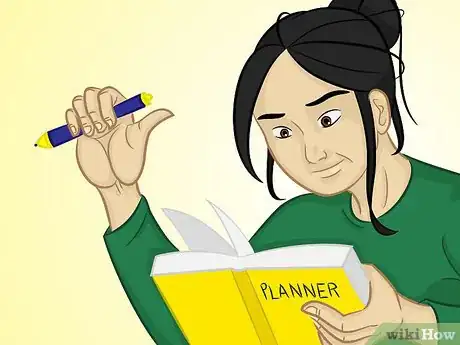
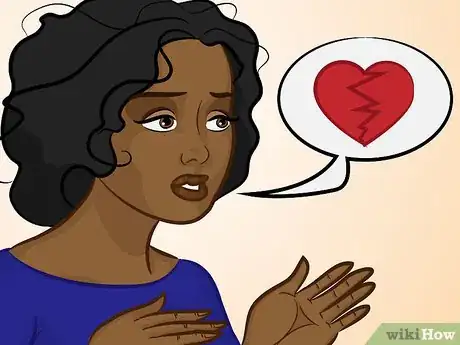



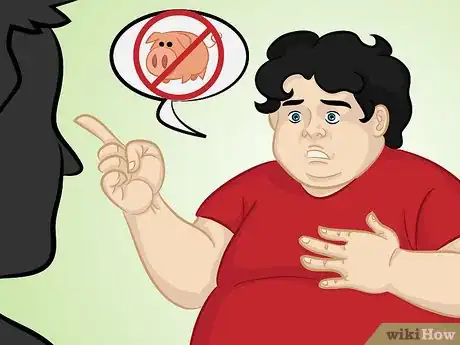
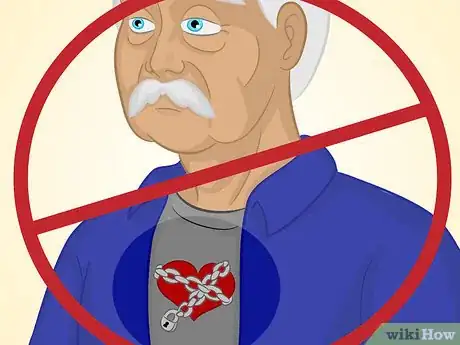

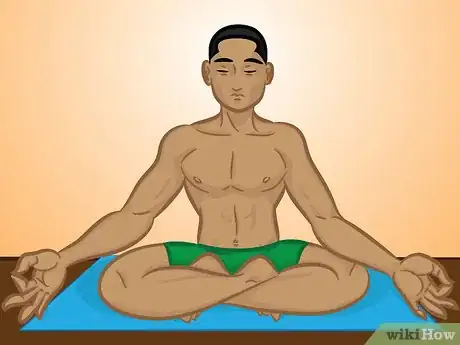





























































Medical Disclaimer
The content of this article is not intended to be a substitute for professional medical advice, examination, diagnosis, or treatment. You should always contact your doctor or other qualified healthcare professional before starting, changing, or stopping any kind of health treatment.
Read More...